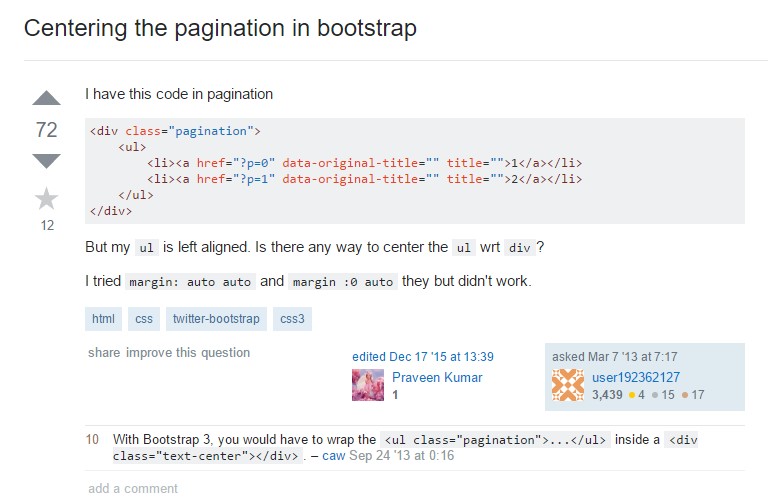Bootstrap Pagination Example
Intro
An upward direction in the front-end world is the use of the CSS frameworks together with basis styles for our web page. Rather than starting each and every project from scratch, crafting every design in the hand , currently there are frameworks that actually deliver a completely constructed infrastructure from where we will launch our app. There are a lot of alternatives, but Bootstrap is quite possibly the absolute most recognized. It was launched as open source and the project has improved in completion and importance in the market.
Bootstrap carries a lot of functions:
● Totally reset CSS
● Basis graphical appearance for a large number of tags
● Icons.
● Grids ready for use.
● CSS Elements.
● JavaScript Plugins.
● Total responsive and mobile-first .
As its name implies, it is a way to start the project shortly with a very simple design and capabilities without losing design time in the starting point.
General pagination principles.
Paging becomes necessary Whenever we have a page with many items to display. We understand that in the case of listings, including exposing products in internet stores or even search results in systems, the goal is not to expose all of the things instantly, but alternatively to set up them properly, helping to make them much easier to have access to, much faster and more standard web pages.
Listed below are some outstanding strategies in the use of Bootstrap Pagination, no matter what the technology applied ( check this out)
Pagination: an unneeded title.
Paging dispenses the title when well designed. That is , if you needed to write "Pagination" for the user of Bootstrap Pagination How to work with, there is some thing wrong: consider redesigning it!
Great visualness and placing.
Paging is a completing site navigation and should certainly come with great placing and very good visibility. Use fonts with proportions and colours that follow the style of web page usage, delivering excellent visibility and locating it properly after the object list ends.
Be simple.
A number of paging tools offer enhanced navigating functions like going straight to a specific webpage or perhaps developing a specific number of pages instantly. Although they are extra elements, users are better familiar with easy designs and perform more effective by using traditional designs.
Produce sorting solutions.
A good and advised function is to generate sorting methods to optimize their use.
Do not use subscript styles on links.
In paging instruments, all these functions are unnecessary, because the hyperlinks are noticeable and the subscript style will simply keep the visual filled. ( read more)
Grant proper zone for clickable local areas.
The bigger the clickable place the much more accessible the tabs become and for that reason much simpler to employ.
Grant fields in between hyperlinks
Zone from one tab to some other will help to make paging much more comfortable and user-friendly , avoiding undesirable connection.
Detect the present page and generate the standard navigation web links.
The paging function is to facilitate user site navigation, so the instrument should keep it understandable precisely where the user is, where he has been and where he can go on.
Generate helpful site navigation urls like "Previous Page" and also "Next Page", regularly fixing them at the start and finish.
Generate helpful shortcuts and additional details
Links to the "first page" and "last page" are usually handy, keep in mind them in the case that it is required!
Put into action a wrapping
<nav>Additionally, as web pages probably have over one such site navigation area, it's a good idea to offer a descriptive
aria-labelaria-label="Search results pages".<nav aria-label="Page navigation example">
<ul class="pagination">
<li class="page-item"><a class="page-link" href="#">Previous</a></li>
<li class="page-item"><a class="page-link" href="#">1</a></li>
<li class="page-item"><a class="page-link" href="#">2</a></li>
<li class="page-item"><a class="page-link" href="#">3</a></li>
<li class="page-item"><a class="page-link" href="#">Next</a></li>
</ul>
</nav>Bootstrap Pagination
Classic Bootstrap Pagination jQuery
You may want to add some kind of pagination to each page if you have a site with many pages.
To produce a general pagination, add in the
.pagination<ul>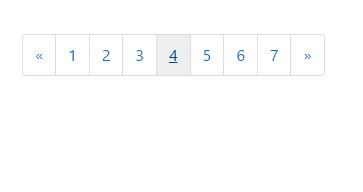
<nav>
<ul class="pagination">
<li class="page-item">
<a href="#" class="page-link" aria-label="Previous">
<span aria-hidden="true">«</span>
</a>
</li>
<li class="page-item"><a href="#" class="page-link">1</a></li>
<li class="page-item"><a href="#" class="page-link">2</a></li>
<li class="page-item"><a href="#" class="page-link">3</a></li>
<li class="page-item"><a href="#" class="page-link">4</a></li>
<li class="page-item"><a href="#" class="page-link">5</a></li>
<li class="page-item"><a href="#" class="page-link">6</a></li>
<li class="page-item"><a href="#" class="page-link">7</a></li>
<li class="page-item">
<a href="#" class="page-link" aria-label="Next">
<span aria-hidden="true">»</span>
</a>
</li>
</ul>
</nav>Bootstrap 4 and Bootstrap 3 characteristics
Bootstrap 3 only requests the
.paginationBootstrap 4, as well as the
.pagination.page-item<li>.page-link<a>Using icons
Aiming to take an icon or symbol in place of content for several pagination web links? Don't forget to produce appropriate screen reader support with
aria.sr-only<nav aria-label="Page navigation example">
<ul class="pagination">
<li class="page-item">
<a class="page-link" href="#" aria-label="Previous">
<span aria-hidden="true">«</span>
<span class="sr-only">Previous</span>
</a>
</li>
<li class="page-item"><a class="page-link" href="#">1</a></li>
<li class="page-item"><a class="page-link" href="#">2</a></li>
<li class="page-item"><a class="page-link" href="#">3</a></li>
<li class="page-item">
<a class="page-link" href="#" aria-label="Next">
<span aria-hidden="true">»</span>
<span class="sr-only">Next</span>
</a>
</li>
</ul>
</nav>Active capacity
The active state reveals what exactly the present webpage is.
Add
.active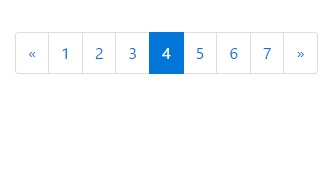
<nav>
<ul class="pagination">
<li class="page-item">
<a href="#" class="page-link" aria-label="Previous">
<span aria-hidden="true">«</span>
</a>
</li>
<li class="page-item"><a href="#" class="page-link">1</a></li>
<li class="page-item"><a href="#" class="page-link">2</a></li>
<li class="page-item"><a href="#" class="page-link">3</a></li>
<li class="page-item active"><a href="#" class="page-link">4</a></li>
<li class="page-item"><a href="#" class="page-link">5</a></li>
<li class="page-item"><a href="#" class="page-link">6</a></li>
<li class="page-item"><a href="#" class="page-link">7</a></li>
<li class="page-item">
<a href="#" class="page-link" aria-label="Next">
<span aria-hidden="true">»</span>
</a>
</li>
</ul>
</nav>Disabled Form
A disabled hyperlink can not be clicked on:
Add
.disabled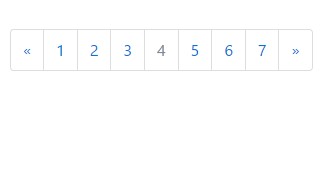
<nav>
<ul class="pagination">
<li class="page-item">
<a href="#" class="page-link" aria-label="Previous">
<span aria-hidden="true">«</span>
</a>
</li>
<li class="page-item"><a href="#" class="page-link">1</a></li>
<li class="page-item"><a href="#" class="page-link">2</a></li>
<li class="page-item"><a href="#" class="page-link">3</a></li>
<li class="page-item disabled"><a href="#" class="page-link">4</a></li>
<li class="page-item"><a href="#" class="page-link">5</a></li>
<li class="page-item"><a href="#" class="page-link">6</a></li>
<li class="page-item"><a href="#" class="page-link">7</a></li>
<li class="page-item">
<a href="#" class="page-link" aria-label="Next">
<span aria-hidden="true">»</span>
</a>
</li>
</ul>
</nav>Pagination Sizing
Paging blocks can as well be sized to a larger or smaller sizing.
Add
.pagination-lg.pagination-sm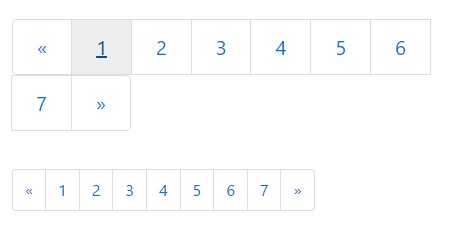
<nav>
<ul class="pagination pagination-lg">
<li class="page-item">
<a href="#" class="page-link" aria-label="Previous">
<span aria-hidden="true">«</span>
</a>
</li>
<li class="page-item"><a href="#" class="page-link">1</a></li>
<li class="page-item"><a href="#" class="page-link">2</a></li>
<li class="page-item"><a href="#" class="page-link">3</a></li>
<li class="page-item"><a href="#" class="page-link">4</a></li>
<li class="page-item"><a href="#" class="page-link">5</a></li>
<li class="page-item"><a href="#" class="page-link">6</a></li>
<li class="page-item"><a href="#" class="page-link">7</a></li>
<li class="page-item">
<a href="#" class="page-link" aria-label="Next">
<span aria-hidden="true">»</span>
</a>
</li>
</ul>
</nav>
<nav>
<ul class="pagination">
<li class="page-item">
<a href="#" class="page-link" aria-label="Previous">
<span aria-hidden="true">«</span>
</a>
</li>
<li class="page-item"><a href="#" class="page-link">1</a></li>
<li class="page-item"><a href="#" class="page-link">2</a></li>
<li class="page-item"><a href="#" class="page-link">3</a></li>
<li class="page-item"><a href="#" class="page-link">4</a></li>
<li class="page-item"><a href="#" class="page-link">5</a></li>
<li class="page-item"><a href="#" class="page-link">6</a></li>
<li class="page-item"><a href="#" class="page-link">7</a></li>
<li class="page-item">
<a href="#" class="page-link" aria-label="Next">
<span aria-hidden="true">»</span>
</a>
</li>
</ul>
</nav>
<nav>
<ul class="pagination pagination-sm">
<li class="page-item">
<a href="#" class="page-link" aria-label="Previous">
<span aria-hidden="true">«</span>
</a>
</li>
<li class="page-item"><a href="#" class="page-link">1</a></li>
<li class="page-item"><a href="#" class="page-link">2</a></li>
<li class="page-item"><a href="#" class="page-link">3</a></li>
<li class="page-item"><a href="#" class="page-link">4</a></li>
<li class="page-item"><a href="#" class="page-link">5</a></li>
<li class="page-item"><a href="#" class="page-link">6</a></li>
<li class="page-item"><a href="#" class="page-link">7</a></li>
<li class="page-item">
<a href="#" class="page-link" aria-label="Next">
<span aria-hidden="true">»</span>
</a>
</li>
</ul>
</nav>Transform the positioning of pagination parts by using flexbox utilities.

<nav aria-label="Page navigation example">
<ul class="pagination justify-content-center">
<li class="page-item disabled">
<a class="page-link" href="#" tabindex="-1">Previous</a>
</li>
<li class="page-item"><a class="page-link" href="#">1</a></li>
<li class="page-item"><a class="page-link" href="#">2</a></li>
<li class="page-item"><a class="page-link" href="#">3</a></li>
<li class="page-item">
<a class="page-link" href="#">Next</a>
</li>
</ul>
</nav>
<nav aria-label="Page navigation example">
<ul class="pagination justify-content-end">
<li class="page-item disabled">
<a class="page-link" href="#" tabindex="-1">Previous</a>
</li>
<li class="page-item"><a class="page-link" href="#">1</a></li>
<li class="page-item"><a class="page-link" href="#">2</a></li>
<li class="page-item"><a class="page-link" href="#">3</a></li>
<li class="page-item">
<a class="page-link" href="#">Next</a>
</li>
</ul>
</nav>Check out a number of video clip guide about Bootstrap Pagination
Connected topics:
Bootstrap pagination official documents
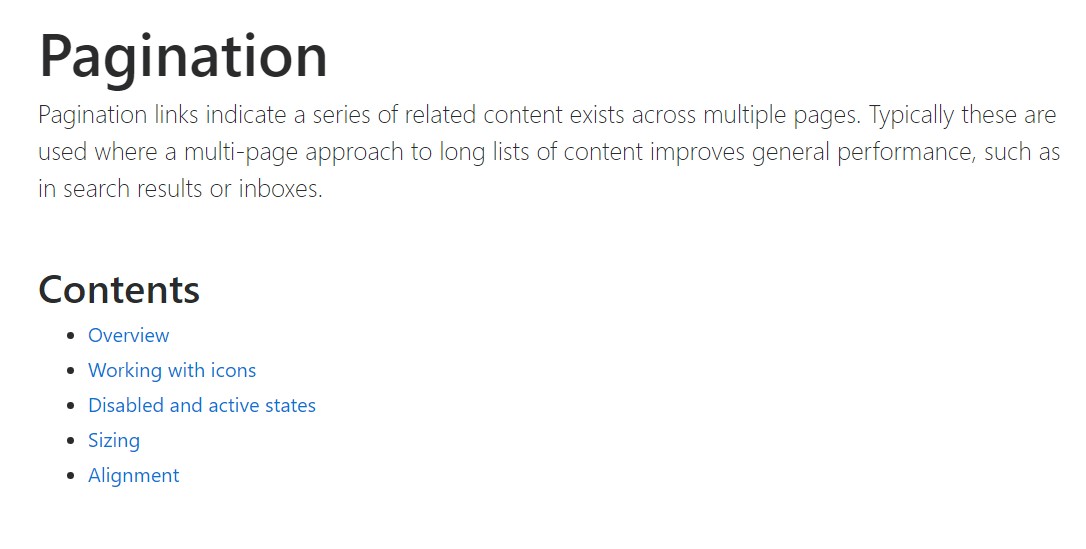
W3schools:Bootstrap pagination tutorial
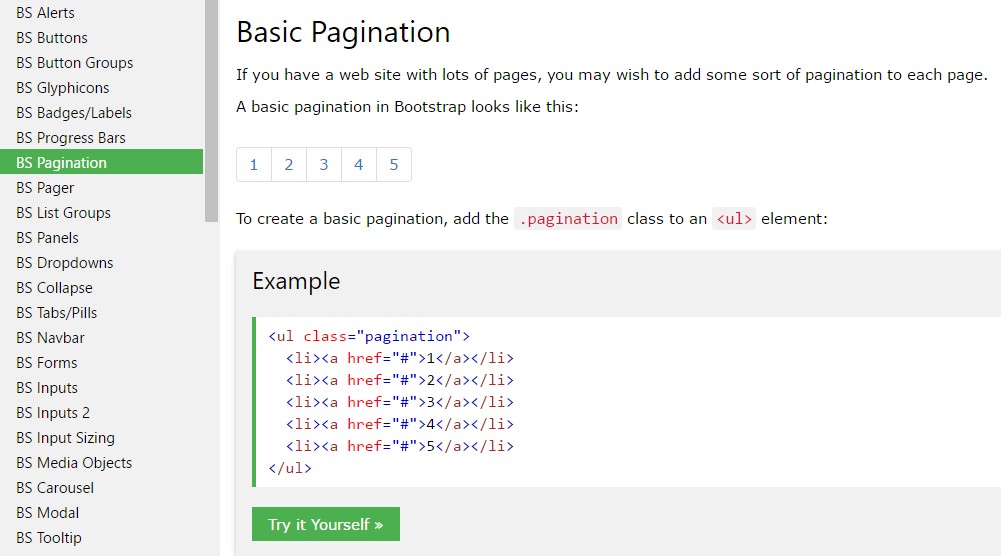
Centering the pagination in Bootstrap
